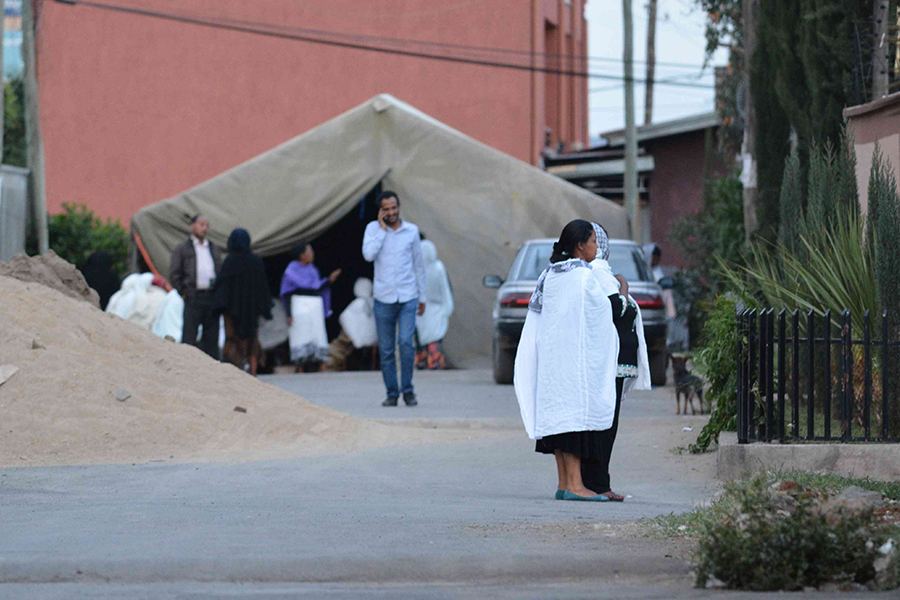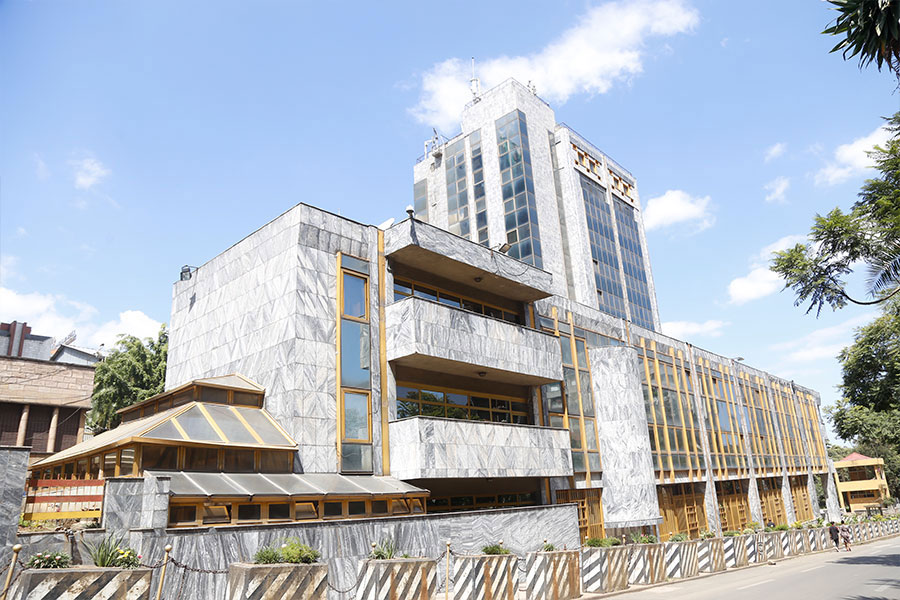
Agenda | Jul 21,2024
A narrow alley around the Piassa area called 'Doro Maneqia' used to be a bustling hotspot for meat aficionados who flock to the area in search of affordable beefy delicacies.
While the once crowded street no longer has the glory with more butcheries opening up across the city, a string of 13 spots are lined up fetching customers right off the street.
Most establishments are three decades old at least while some even stretch back to half a century.
Tsegaye Tadesse Butchery, a four-decade-old cosy shack that is preferred by customers for its 'Kitfo' at 1000 Br a kilogram, is seeing tough times. The owner Tsegaye who inherited the business from family, observes inflation has been grinding at their customers' pockets while taxes chip away at their revenues, forcing the legacy establishment to slash its staff by half.
He had to cut back on daily purchases as well, opting to buy an ox every three days as opposed to one for each day in the not-too-distant past. He said most of the meat seen hanging in butcheries is from the fridge instead of fresh slaughters.
"There were no seats during lunchtime," said Tsegaye recalls a few years ago. He claims to have witnessed the price of meat increase 10-fold in the 15 years since the Ethiopian millennium.
The charismatic owner attributes the slowdown in business primarily to inflation and taxes, contraband cattle trade fueling price hikes and pricy rent expenses. Most of the meat shops in the area pay rent between 13,000 all the way up to 20,000 Br.
Despite the frustrations of the owners, raw meat gourmets like Dawit Barega frequent the narrow alley in the St. Giorgis area at least twice a week.
Tadesse Butchery around the Piassa area.
The Broker believes that goat meat possesses medicinal qualities and does not consider it a delicacy. He also enjoys the buzzing atmosphere of traders, customers and rich conversations.
"The area is rich in history," he told Fortune.
Albeit the absence of precise historical accounts of when Ethiopians started eating raw meat, urban folklore suggests that a local army besieged and hiding from foreign enemies started to eat the meat uncooked so as not to attract attention via smoke. Be it a result of disguising presence from foreign aggressors or just a culinary preference, raw meat is entrenched in the Ethiopian diet.
Consumption of the delicacy has now risen to a recreational activity with expansive establishments splicing posh bars with selections of meat delicacies hanging by the door.
A three-kilometre stretch of road between Jemo Square and Lebu Avenue has around 50 establishments that offer meat nourishment in one form or another. Some are tight little corner shops that sell to customers looking to eat at home, while others are massive businesses that provide comprehensive packages fully fitted with a bar, enormous speakers and a sizeable staff.
The decade-old Benazo Hotel around the Lebu area has an army of 60 employees distributed across its spacious accommodations right by the main road. Women clad in tight-fitted white dresses, easily mistakable for customers rather than waiters, welcome entrants with friendly smiles as they walk in the door.
Birhanu Abebe is a Dire Dewa native who has managed the establishment for nearly a decade. He said their hotel was the first in the area that has now become a buzzing nighttime hub for customers looking for beefy dinners and some dancing.
"Our 'Qurt' attracts customers," said Birhanu, pointing to customers sparsely seated at the hotel.
The Hotel's main proposition is goat meat, which goes for 1,800 Br a kilo after prices increased by 200 Br two months ago. Birhanu has observed that the general inflation rate affecting the overall economy has un-surprisingly caught up with their business. Birhanu said their profit lies only in the sale of alcohol with the overhead costs of supplying the meat shredding at the revenues.
Following the rise in goat prices to 17,000 Br a piece from 14,000 Br, the hotel has cut down on its daily purchases from five to three pieces.
A fuzzy, warm feeling accompanied by a sense of elation is related by many of the local gourmets who frequent raw meat in their diet.
Amanuel Tegegn, a businessman and regular customer at Benazo, finds the price increments to be reasonable considering the general inflation in the rest of the economy. He comes down to the hotel at least twice a week and washes down a kitfo with cold beer.
"It's a rejuvenating experience," said Amanuel.
Meat consumption was a pivotal turning point in the evolution of humans, according to an article by renowned anthropologist Briana Pobiner published in Nature Journal. It became a part of the diet nearly 2.6 million years ago as man started biting into the marrows of large animals, shifting from a diet primarily composed of fruits, nuts, flowers and leaves.
There are over 1,000 butchers in the capital that are members of the Addis Abeba Butchers Association.
Declining sales, inflation and huge taxation are the major burdens felt by the members, according to Ayele Sahle, president of the Association.
"Scores are leaving the business these days," he told Fortune.
He said members are struggling to deal with tax obligations that require a 35pc levy on each slaughter. He has been in the industry from the young age of seven and has seen it progressively decline in profitability. He hopes that government officials recognise the interlinkages that can come about by working with the butchery businesses.
"Everyone should pay taxes but it should not be arbitrarily levied," said Ayele in reference to the method of estimating revenue based on the location of a business.
Ethiopia boasts the continent’s largest livestock population, with over 160 million cattle, sheep, and goats combined. The figure is lost on Ayele who bemusingly enquired about how meat is expensive in a country that has such a large population of cattle, underscoring the brushing aside of the sector by officials.
With nearly half of the output from a single slaughter being unsuitable for ingestion, Ayele emphasizes that every part can be made to bring in some form of revenue. He says the animal feed, leather and export sectors can all benefit from thriving butcheries.
"They need to recognise the value of the businesses," he told Fortune.
PUBLISHED ON
Sep 10,2023 [ VOL
24 , NO
1219]

Agenda | Jul 21,2024

Radar | Nov 20,2023

Radar | May 31,2025

Radar | Feb 03,2024

Commentaries | Aug 01,2020

Dec 22 , 2024 . By TIZITA SHEWAFERAW
Charged with transforming colossal state-owned enterprises into modern and competitiv...

Aug 18 , 2024 . By AKSAH ITALO
Although predictable Yonas Zerihun's job in the ride-hailing service is not immune to...

Jul 28 , 2024 . By TIZITA SHEWAFERAW
Unhabitual, perhaps too many, Samuel Gebreyohannes, 38, used to occasionally enjoy a couple of beers at breakfast. However, he recently swit...

Jul 13 , 2024 . By AKSAH ITALO
Investors who rely on tractors, trucks, and field vehicles for commuting, transporting commodities, and f...

Jun 28 , 2025
Meseret Damtie, the assertive auditor general, has never been shy about naming names...

Jun 21 , 2025
A well-worn adage says, “Budget is not destiny, but it is direction.” Examining t...

Jun 14 , 2025
Yet again, the Horn of Africa is bracing for trouble. A region already frayed by wars...

Jun 7 , 2025
Few promises shine brighter in Addis Abeba than the pledge of a roof for every family...